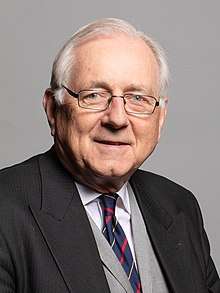Father of the House (United Kingdom)
The Father of the House is a title that is bestowed on the senior member of the House of Commons who has the longest continuous service. If two or more members have the same length of current uninterrupted service, then whoever was sworn in earliest, as listed in Hansard, is named as Father of the House.[1]
| Father of the House | |
|---|---|
The only formal duty of the Father of the House is to preside over the election of the Speaker of the House of Commons. However, the relevant Standing Order does not refer to this member by the title of "Father of the House", but instead to the longest-serving member of the House present who is not a Minister of the Crown. Until 1971, the Clerk of the House of Commons presided over the election of the Speaker. As the clerk is never a member, and therefore is not permitted to speak, he would silently stand and point at the Member who was to speak. However, this procedure broke down at the election of a new Speaker in 1971 and was changed upon the recommendation of a select committee.[2]
Until 6 November 2019, the Father of the House of Commons was Kenneth Clarke, a Conservative MP until 3 September, and then an Independent MP,[3] for Rushcliffe. Clarke began his continuous service at the 1970 general election. He declined to seek re-election and he retired before the 2019 general election. Dennis Skinner, Labour MP for Bolsover, also began continuous service at the 1970 general election, but was sworn in after Clarke.[4][5][1] Skinner contested the 2019 General Election, but was defeated, and so Sir Peter Bottomley, who has been an MP continuously since 1975, became Father of the House.
History
Historically, the Father of the House was not a clearly defined term, and it is not clear by what process it was used for individual Members. The first recorded usage of the term dates to 1788, in an obituary of Thomas Noel (MP); it is also attested in an engraved portrait of Whitshed Keene by Charles Picart, from 1816. It may have been interpreted at various times as the oldest member, the member with the longest total service, the member with the longest unbroken service (the modern definition), or the member who entered the House longest ago. There is also some evidence that in the late 19th century, the position may have been elected. The modern definition was not settled upon until the late 1890s.[6]
After the Second World War, a convention arose that the Father would normally be a member of the Select Committee on Privileges, but this lapsed following the establishment of the modern Standards and Privileges Committee in the 1990s.[6]
Among the twentieth-century Fathers, there were several very prominent figures; four former Prime Ministers became Father of the House, and a fifth, Henry Campbell-Bannerman was simultaneously Father of the House and Prime Minister from May 1907 until soon before his death during April 1908. Almost all have been Privy Councillors.[6]
To date, all holders of the position have been men, and there has been no formal "Mother of the House".[6] However, the term was used in 2017, by Prime Minister Theresa May, to describe Harriet Harman in recognition of her status as the longest continuously serving woman MP.[7]
List of Fathers of the House since 1899
This list covers all Fathers of the House since W.W. Beach, the first to become Father after the modern approach (longest period of continuous service) was agreed in 1898.[6]
Earlier "Fathers"
This list covers all those who would have been considered Father of the House, by the modern definition, since an arbitrary date of 1701. Many of these will not have been considered "Father of the House" by contemporaries, and some men who were described as such are not listed here.
Longest-serving member of the House of Lords
The title 'Father of the House' is not used in the House of Lords.[6] The longest-serving member is recorded on the House website, though no duties or special distinctions are associated with the position.[8] As of 2019, the longest-serving member is The Lord Denham (Conservative), who first took his seat on 13 December 1949[9] (having succeeded his father in the peerage the previous year). The House of Lords Act 1999 repealed the automatic right of hereditary peers to be members of the House of Lords; Denham was one of those elected to continue as a member under section 2 of the Act.
As of 2019, the longest-serving life peer is The Baroness Masham of Ilton (Crossbench), who is also the longest-serving female member of the House, as well as the senior life peer by date of creation. She first took her seat on 25 February 1970.[10]
References
- Moss, Stephen (2 May 2015). "Labour's Dennis Skinner at 83: 'Father of the House? You must be joking'". The Guardian. Retrieved 2 May 2015.
- "The Speaker" (PDF). Westminster, United Kingdom: House of Commons Information Office. September 2003. pp. 4–5.
- "Boris Johnson to seek election after rebel Tories deliver Commons defeat". Retrieved 4 September 2019.
- "Members Sworn". Hansard. Hansard Digitisation Project. 30 June 1970. Retrieved 5 October 2009.
- "Members Sworn". Hansard. Hansard Digitisation Project. 1 July 1970. Retrieved 1 December 2009.
- Kelly, Richard (6 October 2016). "Father of the House: House of Commons Background Paper SN06399".
- "Election of Speaker". Hansard. UK: Commons. 13 June 2017.
- Parliament.UK – House of Lords FAQS – Membership and principal office holders at parliament.uk
- "Prayers (Hansard, 13 December 1949)". api.parliament.uk.
- "BARONESS MASHAM OF ILTON (Hansard, 25 February 1970)". api.parliament.uk.
